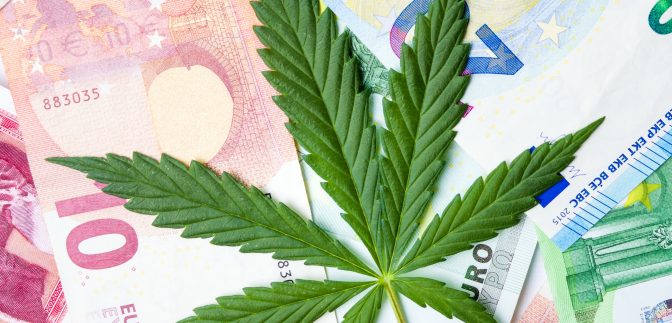Arcview Predicts $57 Billion World Cannabis Market by 2027

Arcview Group‘s new study, ambitiously titled “The Road Map to a $57 Billion Worldwide Market,” provides a sweeping overview of the recent progress and future prospects for legal or medical marijuana across the globe. But it also warns that, largely due to continued legal restrictions and bureaucratic overreach, the market is, in most areas, bottlenecked from achieving its potential.
“Adult-use legalization in California and Canada may have gotten all the ink in 2017, but from a worldwide perspective, the legalization of medical use by Germany in April may prove to be the bigger news,” Tom Adams, editor-in-chief of Arcview Market Research and managing director for BDS Analytics, writes in the introduction. “Germany’s initiative should inspire the rest of Europe, with its population of over a half billion. He also predicts that the expansion of medical cannabis markets can be expected to lead to broader public acceptance, “setting the stage for the eventual move to adult-use legalization” and that this model “will drive the world market, excluding the United States and Canada, to grow at 35% annually to $10.5 billion by 2027, as a key part of the $57 billion overall market.”
As substantial as that market would be, the report states, “The reality is that it falls far short of the market’s potential size for the same reason our North American spending forecasts are well short of total consumer spending on cannabis: Cautious regulators are likely to restrict access and tax the legal business so heavily that they inadvertently ensure the continued existence of a thriving illicit market.»

Europe
Germany positioned itself as Europe’s market leader by liberalizing its medical program in 2017: “While sales there are restricted to pharmacies, the country’s lawmakers have approved a fairly liberal list of qualifying conditions expected to rapidly swell the ranks of registered patients over the course of 2018 and beyond.”
Italy, Belgium, Croatia, the Czech Republic, Finland and Poland are also named as launching similar, if less ambitious, programs. And last July, the Spanish region of Catalonia “moved past tolerance and legalized cannabis, permitting the cultivation, consumption and distribution for members of designated clubs.”
South America
Both Argentina and Peru approved medical-marijuana measures in 2017. But Brazil, with its large population and fairly restrictive medical regime, leads South America in legal spending on cannabis. Medical marijuana was more broadly legalized in Chile and Colombia in 2015. Colombia especially has a fast-growing legal cannabis sector.
Uruguay, of course, rates a special discussion, with its general legalization policy: “Since 2013, the country has been putting the regulations and infrastructure in place to establish a system for state-controlled production and sale of cannabis through pharmacies, which began this past July… Uruguay’s process is being observed by leaders of other South American countries who are looking for an alternative to the Washington-led and largely unsuccessful War on Drugs.»
The report predicts Uruguay and Canada will be «two closely watched market models.»
Canada
According to the report, “Canada’s federal-level legalization of cannabis for medical use has led to rapid growth in that market. Federal legalization of adult use, expected in mid-2018, will extend that even further, as adult members of the country’s population of 36 million gain the right to purchase and consume cannabis legally.”
Furthermore, Canada “is one of the few countries where investors have been confident enough in the legality of the industry to pour millions of dollars into public equity investments. The 88 licensed producers operating in Canada as of January 2018 have already begun securing deals to supply the developing adult-use market.”

Mexican President Enrique Peña Nieto
Mexico
Last July, Mexico’s Secretariat of Health approved the study of «pharmacological derivatives of cannabis.” The bill passed both the Senate and lower house of Congress and was signed into law by President Enrique Nieto Peña. “The move is a small step toward true medical legalization, since the derivatives are limited to products with 1% or less of THC, essentially making Mexico a CBD-only market,” the report notes, though it doesn’t mention that as this legislation was being crafted, there were also advances in the Mexican courts recognizing a right to medical and even recreational cannabis. If the Mexican program broadens in the coming years, the country could have a $106 million cannabis market by 2022.
United States
The various U.S. state laws make cannabis legalization “more complicated than in any other country.” Nonetheless, “adult-use spending in the United States is expected to explode.” California’s market alone could quadruple by 2022.
Miscellaneous
The report notes varying degrees of liberalization in Australia, New Zealand, Israel, India, Jamaica and the U.S. territory of Puerto Rico, which launched its medical program late in 2016 “only to have it devastated, along with the rest of the island, by Hurricane Maria in September 2017.”
In this section, the report erroneously states: «While medical cannabis was officially legalized in the Philippines in 2014, regulations are still being developed and the program is limited.” In fact, the Philippines’ medical-marijuana bill was first introduced in 2014 but is still pending in the country’s legislature.
The report also has some gringo-centric semantic errors. For instance, Uruguay is lauded for having “the first federally legal adult-use market in the world.” Uruguay does not have a federal system, but a centralized government, thereby avoiding the state-by-state policy patchwork of the United States.
The report avoids the word “marijuana,” presumably in the belief that using only the scientific term «cannabis» will erode the stigma that still surrounds this burgeoning global commodity.
Purchase the report here.
RELATED
Cannabis Law Reform Developments Around the World
Netanyahu Shuts Down Israeli’s Cannabis Import Plan
Trump Shows Support for Duterte’s War on Drugs

